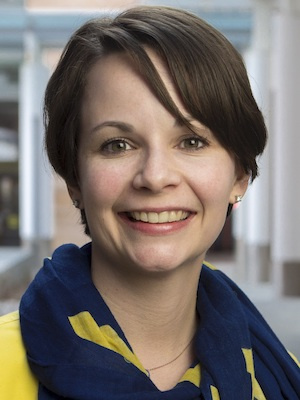Attention Transfer Students: Here Is How We Are Considering Extracurricular Involvement This Year

Engagement in student clubs and organizations has always been a critical part of our admission review process for University of Michigan cross-campus transfer students and those looking to transfer to Michigan Ross from another institution.
We value learning how applicants have engaged with their community during their first or second year on campus because this allows us to better understand how they lead their peers and how well they work in groups - both important experiences needed for the action-based learning environment within the Michigan Ross BBA Program.
This year, things are a bit different.
From talking with prospective U-M and external transfer students in our information sessions and individual admission appointments, I hear stories of how hard it has been to engage in new college-level activities during the pandemic. Many clubs and organizations have pared down activities, including postponing or canceling pivotal club events. This has resulted in fewer opportunities for applicants to acquire new skills on projects and demonstrate their leadership abilities through committee assignments. Likewise, I’ve heard stories of applicants who have reached out to past employers in their hometowns to continue with a previous part-time job, or have continued their involvement in a high school program to sustain those relationships that were pivotal in their pre-college years. I am continually amazed at how students are showing resolve during the pandemic.
But I also understand the need to be transparent and to answer the question: How are you looking at college-level involvement during the pandemic? So, here is how we are training our application readers and admission review committee to consider transfer students’ involvement during the pandemic.
High school activities count
We have always allowed transfer applicants to list high school activities, but we did give the caution that we still wanted to see college-level involvement that first or second year on campus. This year, we know that some of you will rely primarily on high school activities to show your potential for leadership and how you work with others. And that is certainly OK. When listing these high school activities, please think of those in which you were involved for more than one or two years or those for which you held a leadership position or a role that showed active participation, and focus on high school experiences from your junior or senior year, especially those you’ve continued since starting college.
Non-traditional activities are important too
Work experiences always provide an interesting perspective. Working with clients and having a supervisor are certainly experiences different from club involvement, and those will likely be more present in applications this year. Additionally, think of ways that you have spent your time outside of the Zoom classroom experience. For some of you, it has been helping younger siblings with virtual school, while others have engaged with community organizations helping those in need during the pandemic. These non-traditional experiences are important pieces we want to know this year.
Emphasis on a qualitative review
During our application review meetings the last few months, I have been prepping the team for what we may see in your applications this spring. We have come to the conclusion that this will be even more of a qualitative review than usual, so we can understand your experiences during an extraordinary year. We will be looking for ways that you sustained yourself through the pandemic by possibly reigniting a high school job or activity, skills you might have learned through a non-traditional experience, or how you have engaged in activities that align with your future goals. We certainly are not lowering expectations for our applicants, but we are adjusting our evaluations a bit knowing that we will see less college-level involvement and we will need to give more weight to the late high school extracurricular record.
In sum, we have heard you.
That’s why we are exhibiting more openness in our transfer application review process by looking beyond the traditional college club experiences while still maintaining our evaluation standards. As I have said before, we know the pandemic requires flexibility, and we are making the adjustments necessary to make sure we see the whole picture of each applicant.





